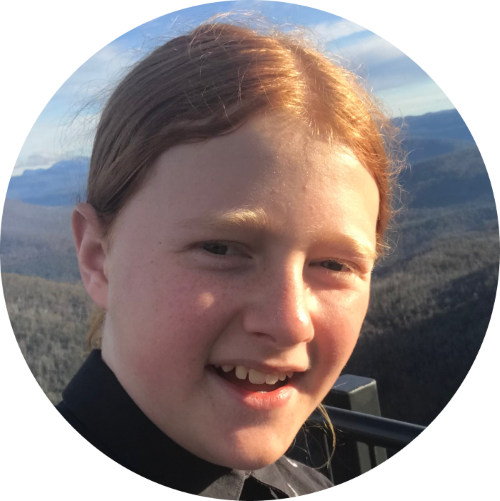
BSc Mathematics
University of New England, Australia
Curriculum Vitae
Arlo is currently studying the Australian National Curriculum at high school, as well as the distance learning degree in maths
YOU’RE STUDYING MATHS AT THE UNIVERSITY OF NEW ENGLAND AT THE AGE OF 12! WHAT’S IT LIKE DOING AN ONLINE DISTANCE COURSE AT SUCH A YOUNG AGE?
Being at university at this age is fun. It is only stressful towards the end of the semester, but even then, it is manageable. I’m not on campus so I just study in class alongside my peers, so to me it’s just like doing normal school work, but way more fun and interesting.
WHICH PART OF YOUR MATHS COURSE DO YOU ENJOY THE MOST?
I love learning in general and there is so much learning to do at uni! My favourite area of maths is multivariable calculus, so learning about things like double integrals, partial derivatives, directional derivatives and Stokes’ Theorem has been awesome!
DOES YOUR HEAD FOR MATHS HELP YOU WITH ANY OTHER SUBJECTS OR HOBBIES?
No, maths is completely useless (just kidding). Yes, it applies to many other areas of life. The higher order thinking it requires is useful to all learning and thought; and learning about the beginnings of mathematics has helped me to develop an understanding of general history and culture over the ages.
DO YOU KNOW WHAT YOU WANT TO BE WHEN YOU’RE OLDER?
I want to be a mathematician when I’m older. When I was younger, I would read books about mathematicians from the past and see them as my idols. So, I guess this has always been my goal.
NOT EVERYONE IS A MATHS GENIUS. IN FACT, A LOT OF PEOPLE THINK THEY CAN’T DO IT. DO YOU HAVE ANY TIPS OR ADVICE FOR THEM?
Don’t worry, no one can be great at everything. Just because you may not be especially skilled in mathematics, it does not mean you cannot pursue your dreams. Maths is like everything else: practise makes perfect.
WE HAVE HEARD THAT YOU ENJOY PLAYING THE ELECTRIC GUITAR. WHAT SORT OF MUSIC ARE YOU INTO?
I like grunge music and alternative rock. Some of my favourite bands are The Offspring, Metallica, Helmet and Something for Kate.
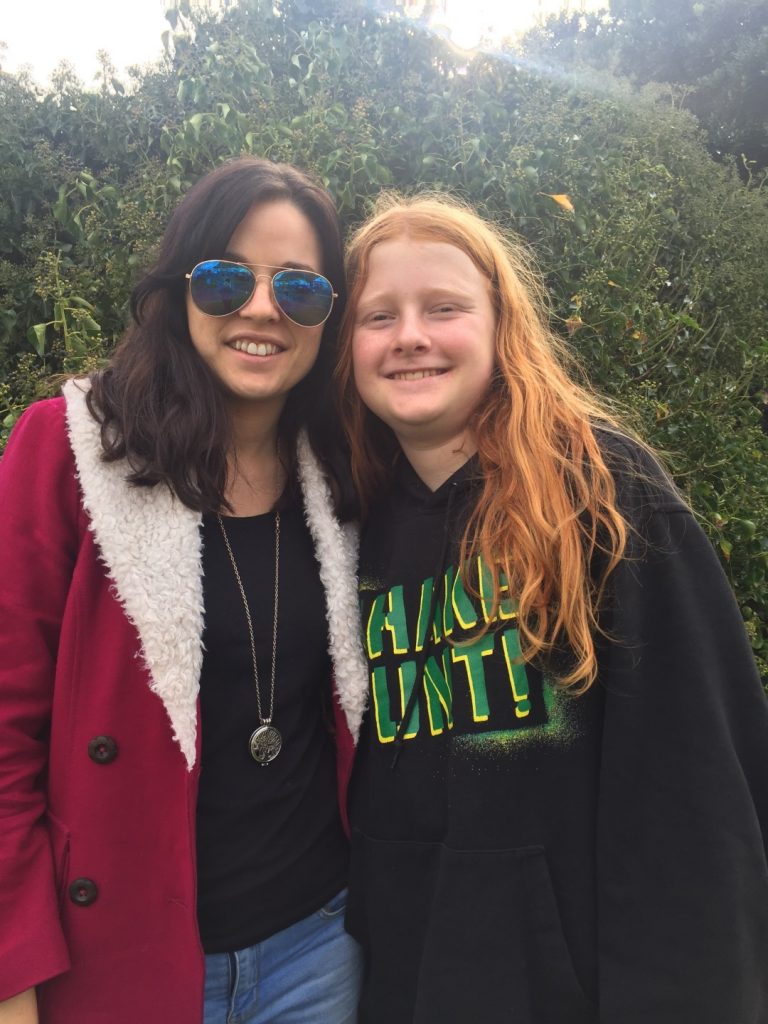
WHEN AND HOW DID YOU FIRST REALISE THAT ARLO HAD AN EXCEPTIONAL GIFT FOR MATHS?
Looking back, I can see now that Arlo’s high intelligence was evident from when he was very young, but at the time, as a young mum, I wasn’t aware that his development was anything out of the ordinary. When our second child was born, a nurse come to visit our new baby, but she spent most of her time watching Arlo, who was 22 months old. She indicated that his play (creating complex patterns with his toys, the repetition in his play, long time periods on the same task, etc.) was quite unusual for his age. When Arlo was three, I started taking him to a local play group and, for the first time, it was very obvious to me (and others) that he was quite different to the other kids – for example, while the other 3 year-old boys zoomed their trucks around the sand pit making motor noises, Arlo spent his time figuring out how the trucks’ axels worked.
IN WHAT WAYS HAVE YOU NURTURED THIS GIFT?
In our household, Arlo is the only lover of maths! We realised we would have to find ways to support him outside of what we could offer at home; for example, over the years, we have picked up many books about maths that Arlo has pored over since he was quite young. Arlo is fortunate to have a grandfather who was high achieving in mathematics at school, so when Arlo was aged 9, he started Skyping him regularly to talk/learn more about maths. The internet has been a brilliant resource for Arlo, from maths YouTube channels to online maths articles.
WHAT CHALLENGES HAVE YOU FACED RAISING A GIFTED CHILD, AND HOW HAVE YOU OVERCOME THEM?
Ensuring Arlo is stimulated in the school setting has been a challenge at times. We found that when Arlo was not sufficiently stimulated in maths and science, he would lose interest in all other subjects, too. Arlo went to a very supportive primary school and we were able to develop a flexible programme that combined online learning with classroom education – and we have continued this into high school: Arlo studies maths and science online and everything else with his peers.
BEN MCCULLOCH. VICE PRINCIPAL, ST BRIGID’S CATHOLIC PRIMARY SCHOOL
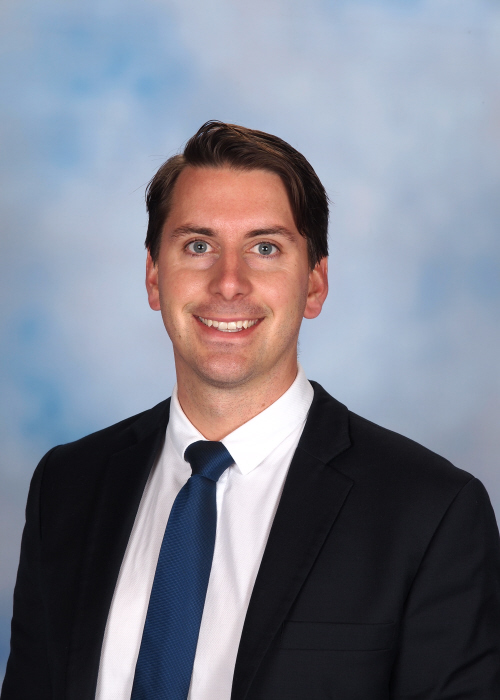
HOW DID THE SCHOOL LEARN ABOUT ARLO’S GIFT FOR MATHS?
From a very young age Arlo displayed advanced cognitive development, and he had a particular inquisitiveness for all things’ science. Arlo’s family fostered a close relationship with the school, enabling a partnership that would continue to blossom throughout his primary education. Frequent communication, the engagement of external professionals, and the analysis of assessments allowed the school to build a clear profile of Arlo’s needs, particularly his gift for mathematics. We knew that without quality enrichment Arlo was at risk of disengaging from his learning.
WHAT SUPPORT DID THE SCHOOL PUT IN PLACE FOR ARLO?
In 2015, as Arlo’s Year Four teacher, I received a scholarship from the Tasmanian Association for the Gifted and completed a Certificate of Effective Practice in Gifted Education. This practical study provided me with vital knowledge and skills to better cater for and understand Arlo’s needs. Throughout the remainder of his primary education our key objectives were for Arlo to remain cognitively stimulated in mathematics and science and for him to maintain meaningful relationships socially with his peers. An example of what learning looked like in mathematics for Arlo in Year Four was that while his peers were learning to read analogue time, he was learning to calculate the velocity of a moving object.
In Year Five, Arlo accessed accelerated learning, engaging in the Year Ten mathematics curriculum and completing Year 12 maths and science by the end of Grade Six. He also attended gifted workshops where he engaged with gifted peers and mentors. As a Code Club Australia and LEGO FIRST Robotics Coach, I actively encouraged Arlo to develop his skills in visual programming. His exceptional computational skills and love for problem solving went hand in hand with computer science, for which he quickly developed a passion. As an educator and one of his key mentors, I quickly learned that it was okay not to be the expert in the room. My role was to provide the opportunities for Arlo to engage in purposeful and challenging experiences that has a strong connection with science, technology, engineering and mathematics.
Between 2015-2017, when Arlo was 7-10 years old, he received awards as part of the University of Tasmania’s Science Investigation Awards. In the 2016 Tasmanian Science Talent Search, Arlo was awarded the Australian Institute of Physics Tasmanian Branch Award – “Best Primary Physics Project on Light Work: Refraction, Wavelength and Speed”. In 2017, Arlo received an award for Outstanding Achievement in the Australian Mathematics Trust Awards.
WHAT ARE THE CHALLENGES OF TEACHING A GIFTED AND TALENTED CHILD?
The first challenge is identification. The diversity of gifted characteristics can make it difficult to identify giftedness. This is exacerbated by the fact that the term “gifted and talented” is often ill-defined. Broad based procedures are required to ensure we pick up those children that may not immediately strike us as falling into the gifted category. Unfortunately, this knowledge base is not present in all schools and systems. In Arlo’s case, he experienced slow processing challenges early on, which was incongruent with his high academic aptitude. Many gifted and talented children can be “twice-exceptional” where their giftedness is accompanied by evidence of one or more disabilities. Misdiagnosis is a threat as academic performance is often inconsistent, such as difficulties with written expression. Such a case can hinder a child’s engagement in learning and have a detrimental impact on their motivation, self-efficacy, dignity and well-being.
Another significant challenge can be balancing academic advancement with critical social skills. Holistic education is key for the well-being of gifted children. Opportunities to work alongside children of similar academic abilities is just as important as opportunities to participate socially with age-equivalent peers. The notion of accelerated learning can be met with angst and fear; however, a strong partnership between home and school can ensure that all needs of the child are met.
IN WHAT WAYS HAVE ARLO’S PEERS AND OTHER SCHOOL CHILDREN BENEFITED FROM THE SCHOOL’S GIFTED AND TALENTED PROGRAMME OF SUPPORT?
Enrichment is one of our key teaching strategies. Engaging students in real-world problem solving, promoting higher order thinking, inquiry and the development of soft skills such as creativity, communication, collaboration and critical thinking benefit all children, not just the gifted and talented! The integration of curriculum in a meaningful way nurtures a culture and love of learning. This was the case for Arlo and his peers. His love of learning emanated throughout the class. All children, including those who are gifted, want to make a difference and, by participating in authentic learning experiences, children are encouraged to help create a preferred future.
WHAT ADVICE DO YOU HAVE FOR OTHER TEACHERS AND SCHOOLS WITH GIFTED AND TALENTED CHILDREN?
Be supportive and flexible to meet the needs of the child. Don’t leave any door unopened. Early intervention and support are critical to ensuring the well-being and academic performance of all children. Evidence-based, high quality learning and teaching can go a long way to engaging the gifted and talented. We must draw on a mixture of behavioural characteristics, levels of performance (both under and over) and the presence of gifted traits to get a clear picture of a child’s strengths and learning needs. As a teacher, if you are unsure, be vulnerable and reach out for assistance. We have a shared responsibility to cater for all students to ensure they learn at high levels.
Moreover, what you put in will come back to you tenfold. The reward you get from seeing a child flourish is invaluable. Seeing Arlo complete his first year of pure mathematics at the University of New England and receive the school prize in Mathematics and Computer Science for “the most distinguished results” is very fulfilling. Even more importantly, he is a really happy guy, connected with friends and family and loving his music.
Finally, the work of Arlo’s parents, Julia and Ned – their loving disposition – has created the conditions for him to flourish.

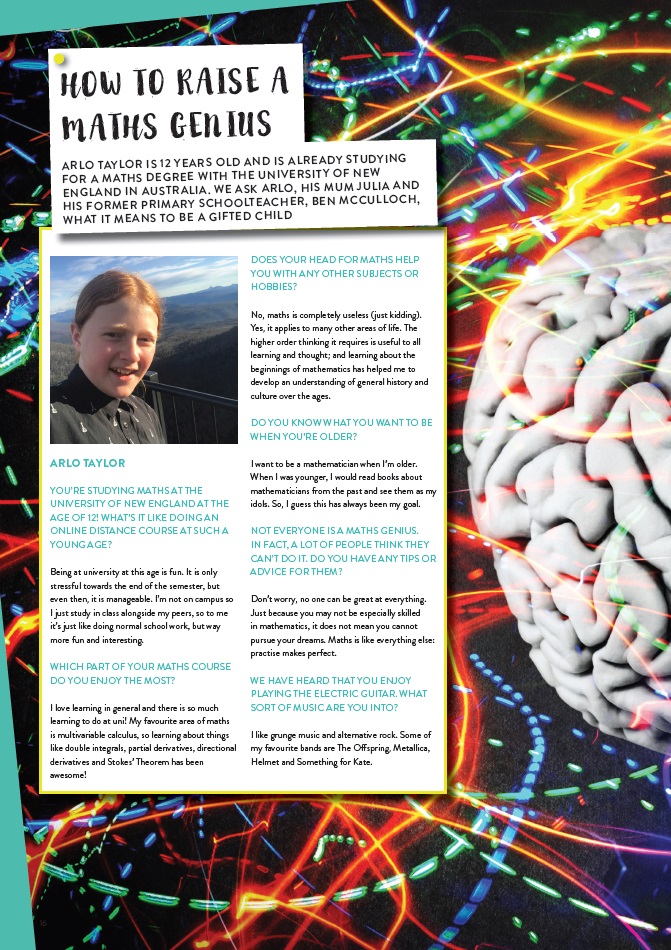
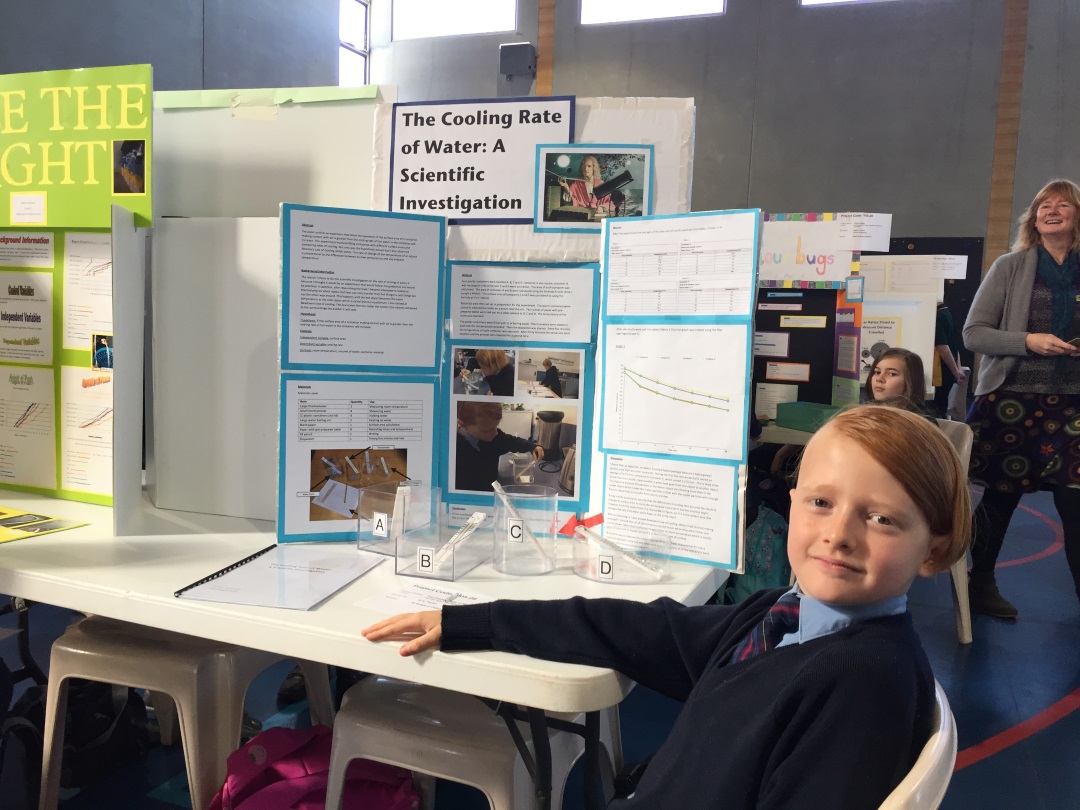
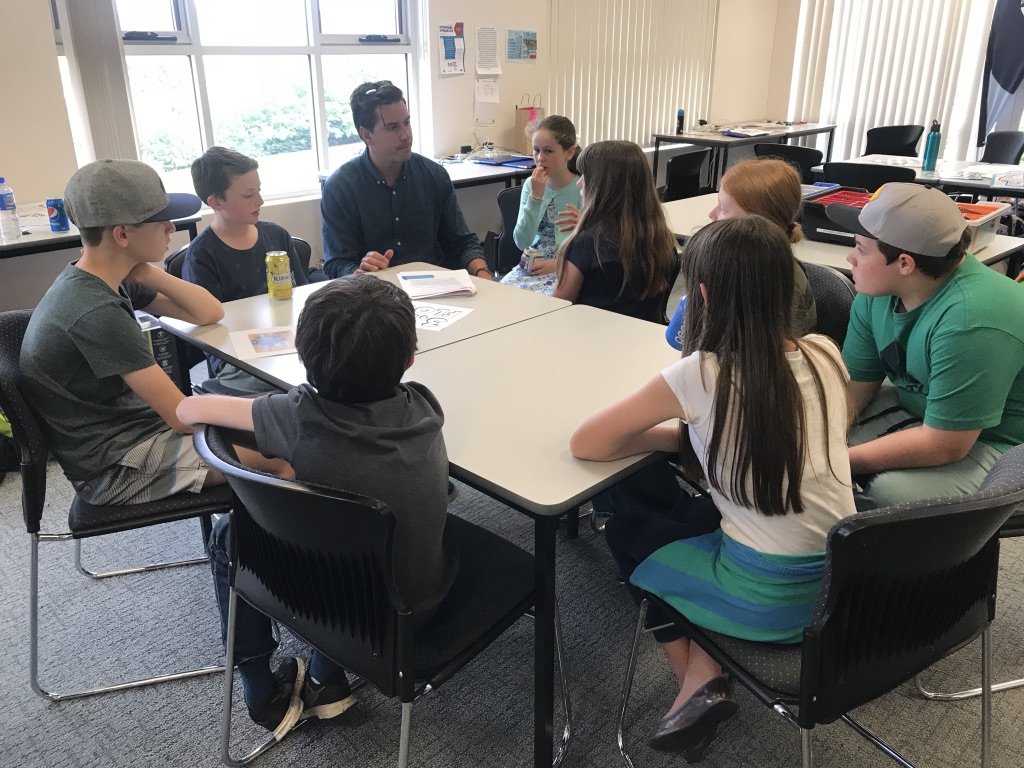
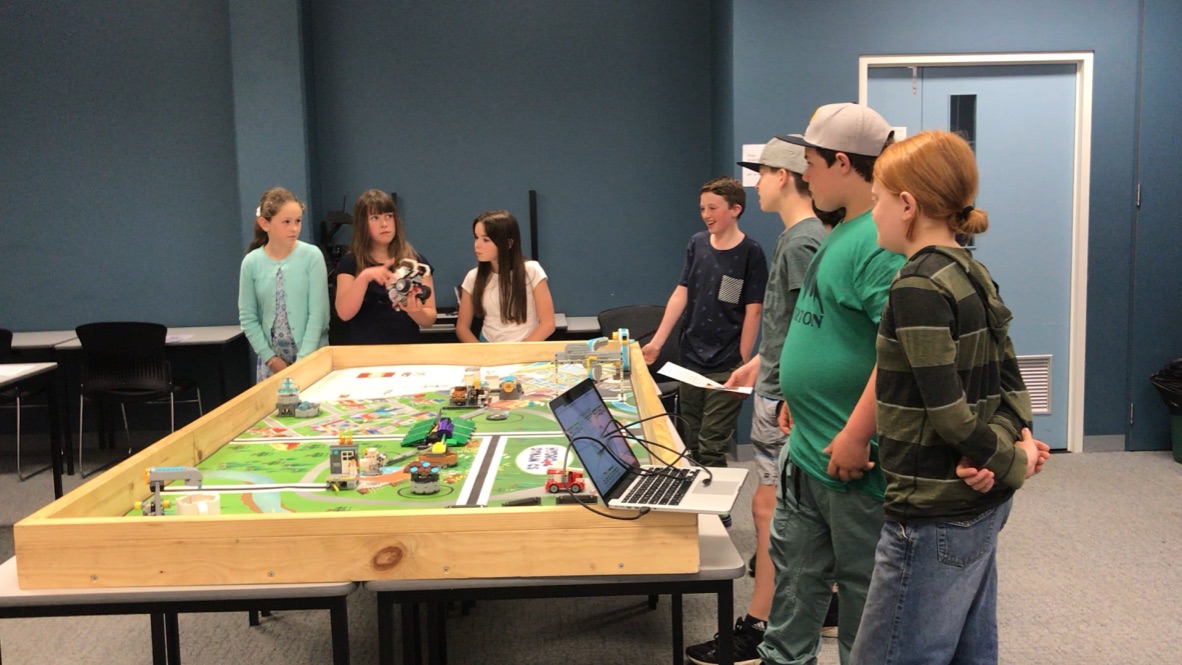
What a inspiring write-up!
Hi , my child is of 9 years is genius in maths like story of Arlington , how can you support me and him to put him in his right way for his future ?
Hi Maha,
Thank you for your email and interest in Arlo’s story. Firstly, I suggest you read some of the maths articles on our website to give your son an understanding of where studies in maths might lead him. Here are two directly related to maths:
https://futurumcareers.com/solving-the-tower-of-hanoi
https://futurumcareers.com/spreading-the-joy-of-mathematics
But other subjects such as physics and computing are all very much related to maths. In fact, maths is integral to so many subjects – even social sciences for data evaluation:
https://futurumcareers.com/how-to-design-a-biology-and-maths-app-for-students-by-students
https://futurumcareers.com/larry-snyder-from-platinum-to-smartphone-how-maths-models-can-be-used-to-streamline-supply-chains
Then, I would suggest you contact some of the researchers in the articles your son is most interested in. They will be very pleased to help and may have other resources to share.
Hope this helps!